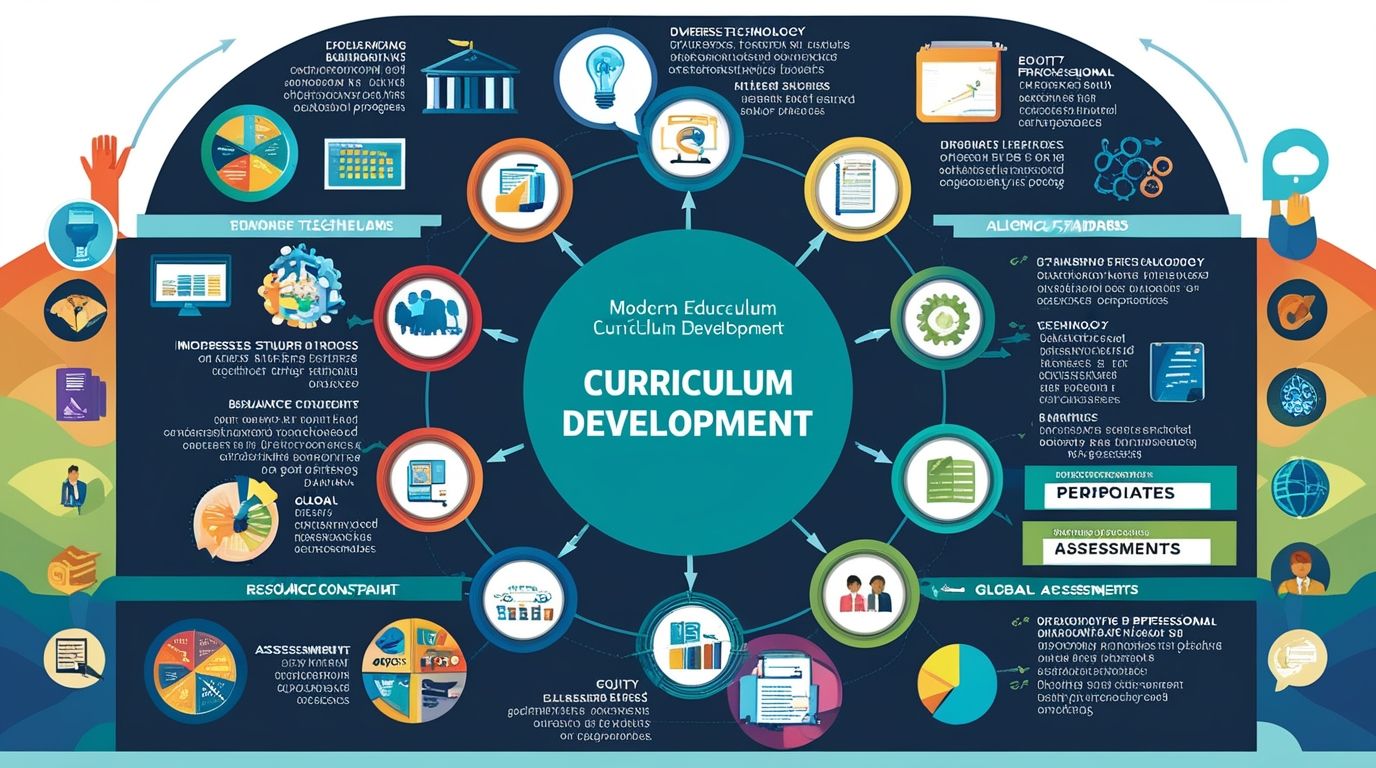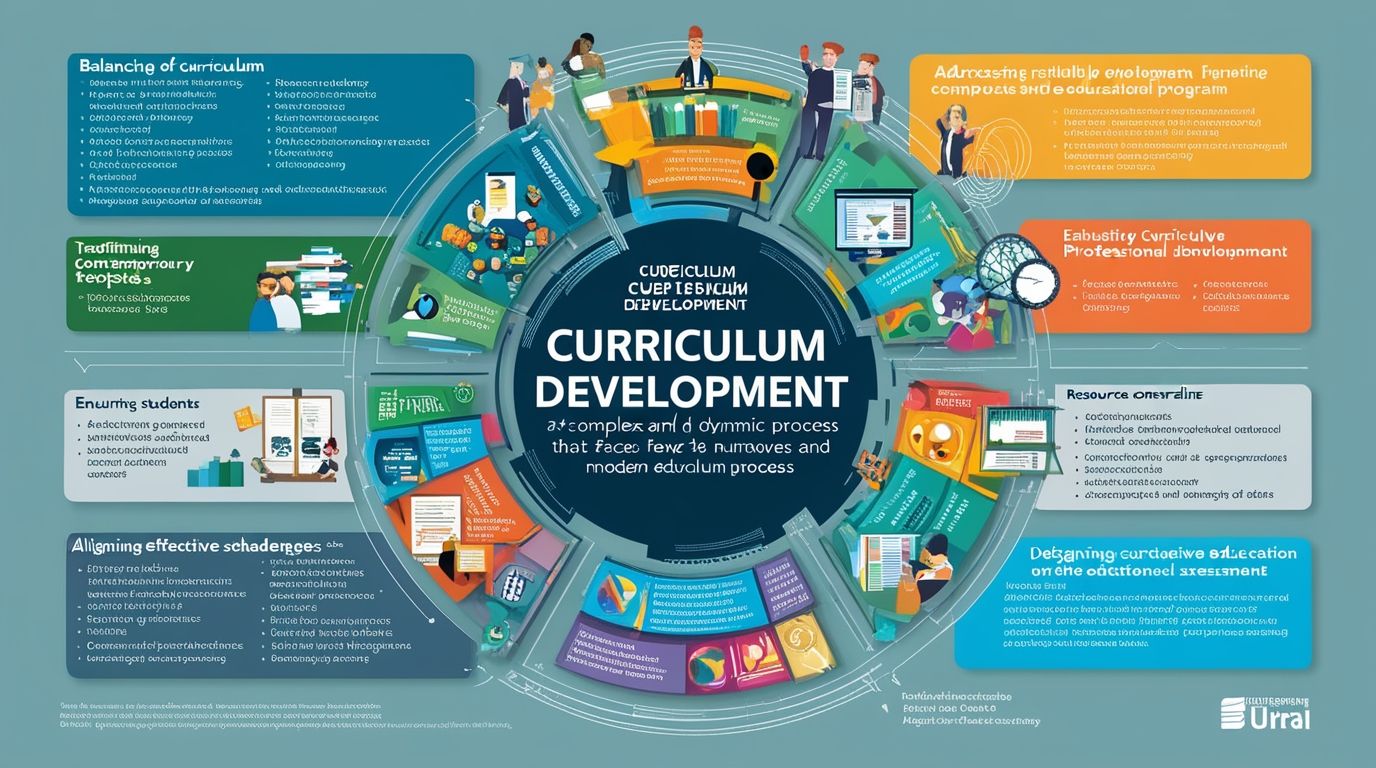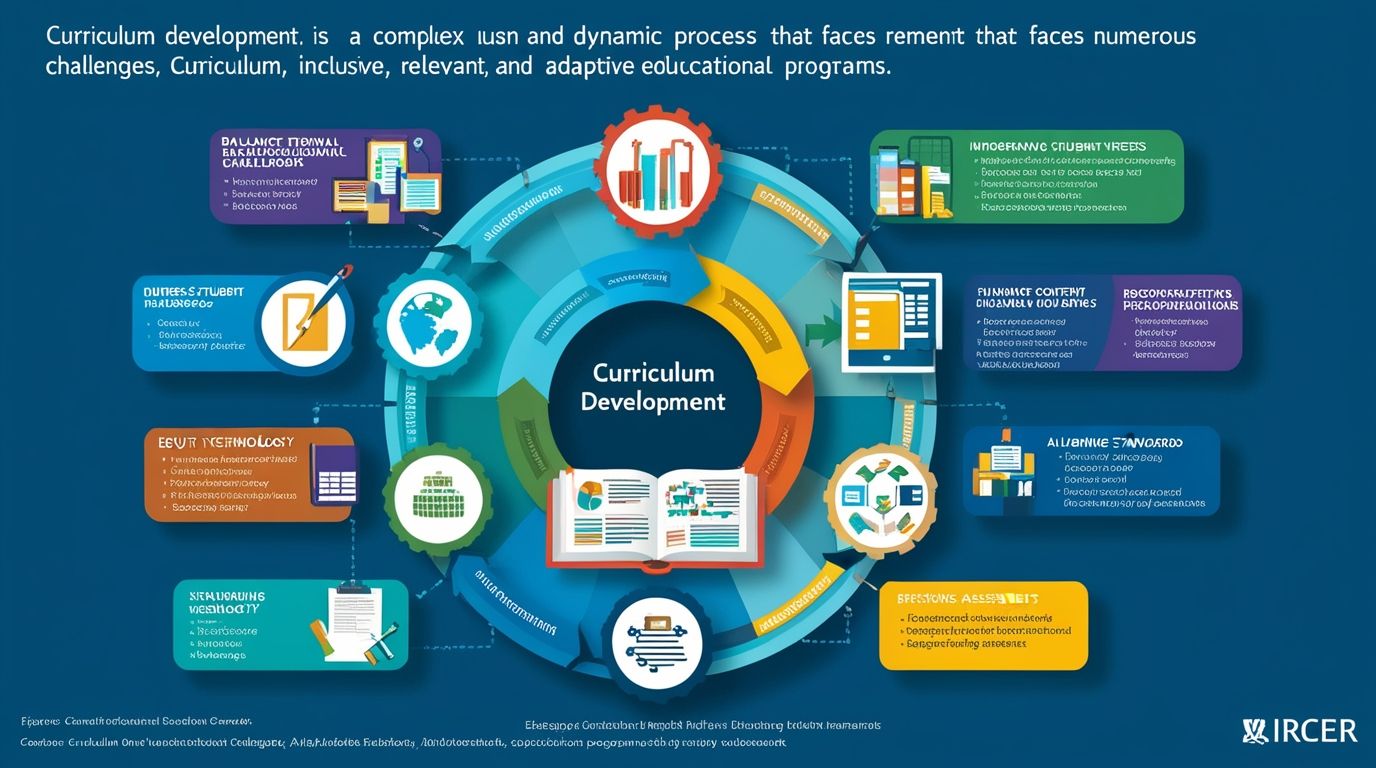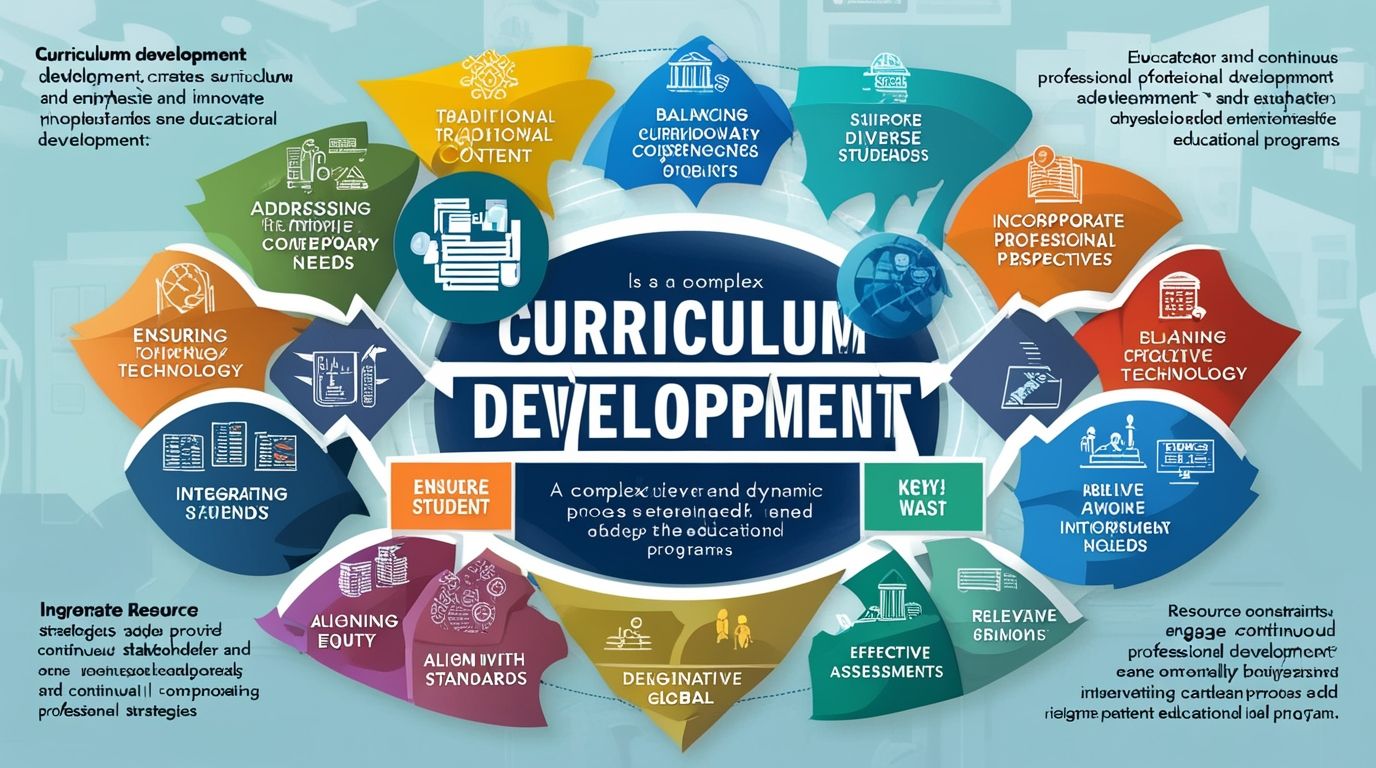Challenges in Curriculum Development: Navigating the Complexities of Modern Education
Challenges in Curriculum Development, Curriculum development is a fundamental aspect of educational systems, shaping the content and methodologies used to educate students. However, developing a curriculum that is comprehensive, relevant, and adaptable is fraught with challenges. These challenges stem from various factors including rapid technological advancements, diverse student needs, and evolving societal expectations. In this article, we explore the key challenges in curriculum development and discuss potential strategies to address them.
The Complexity of Curriculum Development
Curriculum development involves a systematic process of planning, implementing, and evaluating educational programs. It requires careful consideration of various elements such as educational goals, content, teaching methods, and assessment strategies. The primary aim is to create a coherent and effective educational experience that meets the needs of students and society. However, this process is not without its difficulties.
Key Challenges in Curriculum Development
- Balancing Traditional and Modern Content
One of the major challenges in curriculum development is finding the right balance between traditional subject matter and modern, innovative content. While foundational subjects such as mathematics, science, and literature remain crucial, there is an increasing demand for the inclusion of contemporary topics like digital literacy, environmental education, and social-emotional learning.
Strategy: To address this challenge, curriculum developers can adopt a modular approach, allowing for the integration of new subjects without completely overhauling the existing curriculum. Regular reviews and updates can ensure that the curriculum remains relevant and reflective of current trends and advancements.

- Addressing Diverse Student Needs
Students come from diverse backgrounds and have varying learning styles, interests, and abilities. Developing a one-size-fits-all curriculum can lead to disengagement and inequitable educational outcomes. Tailoring the curriculum to meet the diverse needs of students is a significant challenge.
Strategy: Differentiated instruction and inclusive education practices can help address this issue. Curriculum developers should design flexible learning pathways that cater to different learning styles and provide opportunities for personalized learning experiences. Utilizing technology and adaptive learning tools can also support differentiated instruction.
- Integrating Technology
The rapid pace of technological advancement presents both opportunities and challenges for curriculum development. While technology can enhance learning experiences and provide access to vast resources, integrating it effectively into the curriculum requires careful planning and consideration.
Strategy: Curriculum developers should focus on creating a technology-enhanced learning environment that supports both teachers and students. Professional development for educators is crucial to ensure they are equipped to use technology effectively. Additionally, selecting appropriate digital tools and resources that align with educational goals is essential.
- Ensuring Equity and Accessibility
Equity and accessibility are critical considerations in curriculum development. Ensuring that all students, regardless of their socio-economic background, geographic location, or physical and cognitive abilities, have access to quality education is a significant challenge.
Strategy: Developing inclusive curricula that address the needs of marginalized and underserved communities is essential. This includes providing accessible materials, accommodating different learning needs, and ensuring that all students have equal opportunities to succeed. Collaborating with community organizations and stakeholders can also help address equity issues.

- Aligning with Educational Standards and Policies
Curriculum development must align with national and state educational standards and policies. These standards often dictate the content and skills that students must learn, which can limit the flexibility and creativity of curriculum developers.
Strategy: Curriculum developers should work closely with policymakers to ensure that the curriculum meets the required standards while also allowing for innovative and flexible approaches to teaching and learning. Advocacy and collaboration with educational leaders can help shape policies that support comprehensive and adaptable curricula.
- Incorporating Global Perspectives
In an increasingly interconnected world, incorporating global perspectives into the curriculum is essential. However, developing a curriculum that reflects global issues and diverse cultures can be challenging.
Strategy: Integrating global education into the curriculum requires a deliberate effort to include topics such as cultural awareness, global citizenship, and international relations. Collaboration with educators and institutions from different countries can provide valuable insights and resources for developing a globally relevant curriculum.
- Assessment and Evaluation
Effective assessment and evaluation are integral components of curriculum development. However, designing assessments that accurately measure student learning and provide meaningful feedback is a complex task.
Strategy: Curriculum developers should use a variety of assessment methods, including formative and summative assessments, performance-based tasks, and self-assessments. Emphasizing ongoing evaluation and feedback can help ensure that the curriculum remains effective and responsive to student needs.
- Resource Constraints
Limited resources, including funding, time, and personnel, can hinder the curriculum development process. Schools and educational institutions often face budgetary constraints that impact their ability to implement new curricula and provide necessary support.
Strategy: Effective resource management and strategic planning are crucial. Curriculum developers can seek funding from various sources, including government grants, private foundations, and community partnerships. Additionally, leveraging open educational resources (OER) and collaborative efforts can help mitigate resource limitations.

Strategies for Effective Curriculum Development
To overcome these challenges, curriculum developers can adopt several strategies:
- Stakeholder Involvement: Engaging a broad range of stakeholders, including educators, students, parents, industry professionals, and community members, can provide diverse perspectives and insights that enrich the curriculum development process.
- Continuous Professional Development: Providing ongoing professional development for educators ensures that they are equipped with the knowledge and skills needed to implement the curriculum effectively.
- Data-Driven Decision Making: Utilizing data and evidence-based research can inform curriculum design and help identify areas for improvement. Regularly collecting and analyzing data on student performance and feedback can guide revisions and updates.
- Flexibility and Adaptability: Developing a flexible curriculum that can be easily adapted to changing needs and circumstances is crucial. This includes designing modular content and incorporating opportunities for interdisciplinary learning.
- Emphasis on Skills Development: Focusing on the development of critical thinking, problem-solving, collaboration, and communication skills can prepare students for the demands of the modern workforce and society.
- Global and Cultural Relevance: Ensuring that the curriculum reflects global issues and diverse cultural perspectives can help students develop a broader understanding of the world and their place in it.
Conclusion
Curriculum development is a complex and dynamic process that requires careful consideration of numerous factors. While the challenges are significant, they are not insurmountable. By adopting innovative strategies, engaging stakeholders, and maintaining a commitment to equity and excellence, curriculum developers can create educational programs that meet the needs of students and society. Ultimately, a well-developed curriculum is essential for fostering lifelong learning, personal growth, and societal progress.

Your blog is a constant source of inspiration for me. Your passion for your subject matter is palpable, and it’s clear that you pour your heart and soul into every post. Keep up the incredible work!
I have not checked in here for a while since I thought it was getting boring, but the last several posts are great quality so I guess I?¦ll add you back to my everyday bloglist. You deserve it my friend 🙂
Slot Gacor : Situs Slot Online Gacor yang Menjanjikan Kemenangan Besar
Hey there! This is my 1st comment here so I just wanted to give a quick shout out and say I really enjoy reading your posts. Can you recommend any other blogs/websites/forums that deal with the same topics? Appreciate it!
Thanks a bunch for sharing this with all folks you actually recognise what
you are speaking about! Bookmarked. Kindly additionally consult with
my web site =). We could have a link alternate
agreement between us
my page – nordvpn coupons inspiresensation (https://t.co/cFbWYj3h3m)
Hi my loved one! I wish to say that this article is amazing, nice written and include approximately all vital infos. I’d like to see more posts like this .
Hi! I just wanted to ask if you ever have any problems with hackers? My last blog (wordpress) was hacked and I ended up losing many months of hard work due to no data backup. Do you have any solutions to protect against hackers?
I like this site very much, Its a really nice situation to read and get information.
Great paintings! This is the kind of info that should be shared across the net. Shame on Google for now not positioning this put up upper! Come on over and talk over with my website . Thank you =)
Heya i’m for the first time here. I found this board and I find It truly useful & it helped me out a lot. I hope to give something back and help others like you helped me.
What’s Happening i am new to this, I stumbled upon this I’ve found It absolutely useful and it has aided me out loads. I hope to contribute & aid other customers like its helped me. Great job.
I really like looking through and I conceive this website got some truly useful stuff on it! .
I used to be recommended this blog through my cousin. I’m not sure whether this publish is written by him as nobody else recognise such special approximately my problem. You are amazing! Thanks!
Really clean web site, thankyou for this post.
I think other website owners should take this website as an model, very clean and excellent user friendly style and design.
Some times its a pain in the ass to read what website owners wrote but this site is very user genial! .